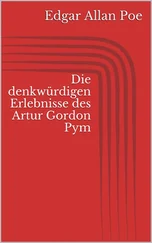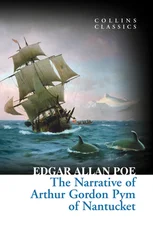Эдгар По - Narrative Of A. Gordon Pym
Здесь есть возможность читать онлайн «Эдгар По - Narrative Of A. Gordon Pym» весь текст электронной книги совершенно бесплатно (целиком полную версию без сокращений). В некоторых случаях можно слушать аудио, скачать через торрент в формате fb2 и присутствует краткое содержание. Жанр: Классическая проза, на английском языке. Описание произведения, (предисловие) а так же отзывы посетителей доступны на портале библиотеки ЛибКат.
- Название:Narrative Of A. Gordon Pym
- Автор:
- Жанр:
- Год:неизвестен
- ISBN:нет данных
- Рейтинг книги:5 / 5. Голосов: 1
-
Избранное:Добавить в избранное
- Отзывы:
-
Ваша оценка:
- 100
- 1
- 2
- 3
- 4
- 5
Narrative Of A. Gordon Pym: краткое содержание, описание и аннотация
Предлагаем к чтению аннотацию, описание, краткое содержание или предисловие (зависит от того, что написал сам автор книги «Narrative Of A. Gordon Pym»). Если вы не нашли необходимую информацию о книге — напишите в комментариях, мы постараемся отыскать её.
Narrative Of A. Gordon Pym — читать онлайн бесплатно полную книгу (весь текст) целиком
Ниже представлен текст книги, разбитый по страницам. Система сохранения места последней прочитанной страницы, позволяет с удобством читать онлайн бесплатно книгу «Narrative Of A. Gordon Pym», без необходимости каждый раз заново искать на чём Вы остановились. Поставьте закладку, и сможете в любой момент перейти на страницу, на которой закончили чтение.
Интервал:
Закладка:
Being nearly destitute of fuel and water, and without proper instruments, it being also late in the season, Captain Morrell was now obliged to put back, without attempting any further progress to the westward, although an entirely open, sea lay before him. He expresses the opinion that, had not these overruling considerations obliged him to retreat, he could have penetrated, if not to the pole itself, at least to the eighty-fifth parallel. I have given his ideas respecting these matters somewhat at length, that the reader may have an opportunity of seeing how far they were borne out by my own subsequent experience.
In 1831, Captain Briscoe, in the employ of the Messieurs Enderby, whale-ship owners of London, sailed in the brig Lively for the South Seas, accompanied by the cutter Tula. On the twenty-eighth of February, being in latitude 66 degrees 30' S., longitude 47 degrees 31' E., he descried land, and "clearly discovered through the snow the black peaks of a range of mountains running E. S. E." He remained in this neighbourhood during the whole of the following month, but was unable to approach the coast nearer than within ten leagues, owing to the boisterous state of the weather. Finding it impossible to make further discovery during this season, he returned northward to winter in Van Diemen's Land.
In the beginning of 1832 he again proceeded southwardly, and on the fourth of February was seen to the southeast in latitude 67 degrees 15' longitude 69 degrees 29' W. This was soon found to be an island near the headland of the country he had first discovered. On the twenty-first of the month he succeeded in landing on the latter, and took possession of it in the name of William IV, calling it Adelaide's Island, in honour of the English queen. These particulars being made known to the Royal Geographical Society of London, the conclusion was drawn by that body "that there is a continuous tract of land extending from 47 degrees 30' E. to 69 degrees 29' W. longitude, running the parallel of from sixty-six to sixty-seven degrees south latitude." In respect to this conclusion Mr. Reynolds observes: "In the correctness of it we by no means concur; nor do the discoveries of Briscoe warrant any such indifference. It was within these limits that Weddel proceeded south on a meridian to the east of Georgia, Sandwich Land, and the South Orkney and Shetland islands." My own experience will be found to testify most directly to the falsity of the conclusion arrived at by the society.
These are the principal attempts which have been made at penetrating to a high southern latitude, and it will now be seen that there remained, previous to the voyage of the Jane, nearly three hundred degrees of longitude in which the Antarctic circle had not been crossed at all. Of course a wide field lay before us for discovery, and it was with feelings of most intense interest that I heard Captain Guy express his resolution of pushing boldly to the southward.
Chapter 17
We kept our course southwardly for four days after giving up the search for Glass's islands, without meeting with any ice at all. On the twenty-sixth, at noon, we were in latitude 63 degrees 23' S., longitude 41 degrees 25' W. We now saw several large ice islands, and a floe of field ice, not, however, of any great extent. The winds generally blew from the southeast, or the northeast, but were very light. Whenever we had a westerly wind, which was seldom, it was invariably attended with a rain squall. Every day we had more or less snow. The thermometer, on the twenty-seventh stood at thirty-five.
January 1, 1828.- This day we found ourselves completely hemmed in by the ice, and our prospects looked cheerless indeed. A strong gale blew, during the whole forenoon, from the northeast, and drove large cakes of the drift against the rudder and counter with such violence that we all trembled for the consequences. Toward evening, the gale still blowing with fury, a large field in front separated, and we were enabled, by carrying a press of sail to force a passage through the smaller flakes into some open water beyond. As we approached this space we took in sail by degrees, and having at length got clear, lay-to under a single. reefed foresail.
January 2.- We had now tolerably pleasant weather. At noon we found ourselves in latitude 69 degrees 10' S, longitude 42 degrees 20' W, having crossed the Antarctic circle. Very little ice was to be seen to the southward, although large fields of it lay behind us. This day we rigged some sounding gear, using a large iron pot capable of holding twenty gallons, and a line of two hundred fathoms. We found the current setting to the north, about a quarter of a mile per hour. The temperature of the air was now about thirty-three. Here we found the variation to be 14 degrees 28' easterly, per azimuth.
January 5.- We had still held on to the southward without any very great impediments. On this morning, however, being in latitude 73 degrees 15' E., longitude 42 degrees 10' W, we were again brought to a stand by an immense expanse of firm ice. We saw, nevertheless, much open water to the southward, and felt no doubt of being able to reach it eventually. Standing to the eastward along the edge of the floe, we at length came to a passage of about a mile in width, through which we warped our way by sundown. The sea in which we now were was thickly covered with ice islands, but had no field ice, and we pushed on boldly as before. The cold did not seem to increase, although we had snow very frequently, and now and then hail squalls of great violence. Immense flocks of the albatross flew over the schooner this day, going from southeast to northwest.
January 7.- The sea still remained pretty well open, so that we had no difficulty in holding on our course. To the westward we saw some icebergs of incredible size, and in the afternoon passed very near one whose summit could not have been less than four hundred fathoms from the surface of the ocean. Its girth was probably, at the base, three-quarters of a league, and several streams of water were running from crevices in its sides. We remained in sight of this island two days, and then only lost it in a fog.
January 10.- Early this morning we had the misfortune to lose a man overboard. He was an American named Peter Vredenburgh, a native of New York, and was one of the most valuable hands on board the schooner. In going over the bows his foot slipped, and he fell between two cakes of ice, never rising again. At noon of this day we were in latitude 78 degrees 30', longitude 40 degrees 15' W. The cold was now excessive, and we had hail squalls continually from the northward and eastward. In this direction also we saw several more immense icebergs, and the whole horizon to the eastward appeared to be blocked up with field ice, rising in tiers, one mass above the other. Some driftwood floated by during the evening, and a great quantity of birds flew over, among which were nellies, peterels, albatrosses, and a large bird of a brilliant blue plumage. The variation here, per azimuth, was less than it had been previously to our passing the Antarctic circle.
January 12.-Our passage to the south again looked doubtful, as nothing was to be seen in the direction of the pole but one apparently limitless floe, backed by absolute mountains of ragged ice, one precipice of which arose frowningly above the other. We stood to the westward until the fourteenth, in the hope of finding an entrance.
January 14.-This morning we reached the western extremity of the field which had impeded us, and, weathering it, came to an open sea, without a particle of ice. Upon sounding with two hundred fathoms, we here found a current setting southwardly at the rate of half a mile per hour. The temperature of the air was forty-seven, that of the water thirtyfour. We now sailed to the southward without meeting any interruption of moment until the sixteenth, when, at noon, we were in latitude 81 degrees 21', longitude 42 degrees W. We here again sounded, and found a current setting still southwardly, and at the rate of three quarters of a mile per hour. The variation per azimuth had diminished, and the temperature of the air was mild and pleasant, the thermometer being as high as fifty-one. At this period not a particle of ice was to be discovered. All hands on board now felt certain of attaining the pole.
Читать дальшеИнтервал:
Закладка:
Похожие книги на «Narrative Of A. Gordon Pym»
Представляем Вашему вниманию похожие книги на «Narrative Of A. Gordon Pym» списком для выбора. Мы отобрали схожую по названию и смыслу литературу в надежде предоставить читателям больше вариантов отыскать новые, интересные, ещё непрочитанные произведения.
Обсуждение, отзывы о книге «Narrative Of A. Gordon Pym» и просто собственные мнения читателей. Оставьте ваши комментарии, напишите, что Вы думаете о произведении, его смысле или главных героях. Укажите что конкретно понравилось, а что нет, и почему Вы так считаете.












